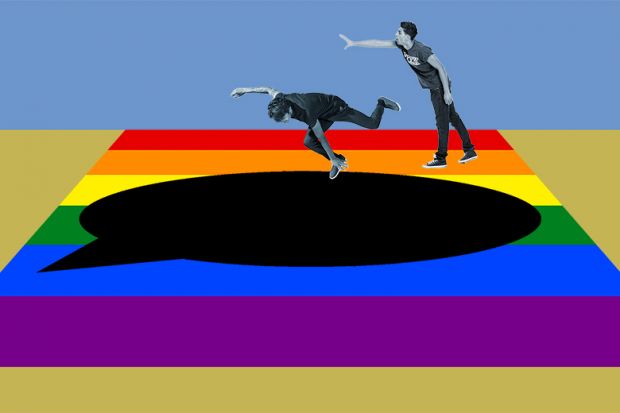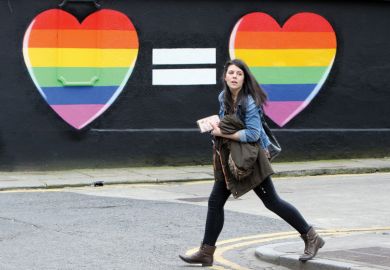Until last summer, I was a lecturer in social sciences at a university in the north of England. I had worked there almost nine years. But I accepted voluntary severance, believing that I had no option but to remove myself from a very sorry state of affairs.
Citing my research interests and given that I am an openly gay academic, my boss had tasked me in late 2022 with teaching a module concerning the topic of intersectionality – the effects of the overlapping of minority categories in particular individuals, such as disabled and Black, or LGBTQ and disabled. I felt I had no option but to agree.
In early 2023, however, I noticed that a couple of anonymous students had left homophobic responses in the module’s online feedback space. Years earlier, I had complained about such spaces being configured to permit anonymous responses and I had been listened to – but now the issue had resurfaced.
The students’ objections were to my expressions of concern about the health and safety of LGBT people worldwide, including those based in Afghanistan, Syria, Kenya and the US. “If [insert my name here] cannot stop talking about LGBT issues he should be replaced,” said one, while another stated: “I’m Muslim and I don’t discuss my beliefs in class and [insert my name here] shouldn’t be discussing his beliefs about LGBTs either.”
After this came a series of emails from one student pitting their religious beliefs versus my “beliefs” about LGBT people. And, despite my voice getting louder, informing my boss and others in HR about the emails, no one stopped him.
I submitted an official grievance complaint and, as part of that process, I made a data access request to obtain all relevant correspondence about me. These emails revealed that a month before I received the anonymous homophobic complaints, a student (most likely the one that had left one of the comments) had emailed management to say he was “annoyed” that I was discussing LGBT issues in class. The intersectionality course, he maintained, was a criminology course and not an LGBT course.
Yet the course director failed to see this as the red flag it was and instead simply asked him whether he had left “any comments online yet”.
In so doing, she tacitly encouraged him to become louder in his opinions, totally contravening my institution’s clear policy forbidding students from citing religious grounds to discriminate against others (which he did in emails that followed).
On appeal, I also raised the fact that the university has broken three UK laws: the Equality Act 2010, the Health and Safety at Work Act 1974 and the 1988 Education Reform Act, the law that governs academic freedom. All of this fell on deaf ears, too.
Responding to my appeal, which included clear evidence of discrimination by the student and evidence of bullying by the course director, I was told by my institution that I should have dealt with the student’s homophobia directly, presumably in person.
Furthermore, I was told that I should have discussed a broader range of issues on the course. In essence, this highlighted how the university totally agreed with the student’s response, which it claimed wasn’t homophobic but simply a complaint about course content and one he was entitled to make.
Advice on creating a higher education system in which LGBTQ+ students, staff and faculty can thrive
For clarity, what I did in teaching this module was to properly mention LGBT people and their marginalisation in some communities. For example, I highlight how gay and trans people can also face domestic violence – an observation which responded to a talk by a guest lecturer. More contentiously, I observed that gay and trans people have been oppressed within Gypsy, Roma and Traveller communities, while I also spoke out about how asylum seekers and refugees from these groups face additional difficulties.
The student was never disciplined. He has been awarded his degree, and he will no doubt continue to voice his opinions beyond university life.
However, the university has totally let down both him and any other students that were witness to his behaviour, irrespective of any religious beliefs they may have. He and others will now believe they can shut down debate of issues they find uncomfortable, rather than engaging critically with such topics.
The university has also let down both me and all LGBT staff and students, as well as colleagues that were supportive of me. Now, outside the university, I remain a queer scholar, but one that has been involuntarily severed from academia.
The author has asked to remain anonymous.
Register to continue
Why register?
- Registration is free and only takes a moment
- Once registered, you can read 3 articles a month
- Sign up for our newsletter
Subscribe
Or subscribe for unlimited access to:
- Unlimited access to news, views, insights & reviews
- Digital editions
- Digital access to THE’s university and college rankings analysis
Already registered or a current subscriber?








